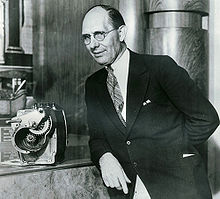Charles Kettering
American inventor, engineer, businessman, and the holder of 140 patents (1876–1958)
Charles Franklin Kettering (29 August 1876 - 24 or 25 November 1958) was an American inventor and social philosopher.

| This article about an engineer, inventor or industrial designer is a stub. You can help out with Wikiquote by expanding it! |
Quotes
edit- You know, you read about the future. You can't help that. I don't look upon the future. I am not a politician. I am not worried about the future at all. I don't like to run it down. I don't like to think of it being too dark because I expect to spend all the rest of my life there and I don't want to have a nasty end to it.
- "Mr. Kettering's Talk", News and Views, General Motors Acceptance Corporation, General Exchange Insurance Corporation, Motors Insurance Corporation, 1936, p. 46
- Variants:
- I object to people running down the future. I am going to live all the rest of my life there, and I would like it to be a nice place, polished, bright, glistening, and glorious.
- As quoted in Professional Amateur: The Biography of Charles Franklin Kettering, by T. A. Boyd 1957, pp. 3–4 (Internet Archive, Google Books)
- My interest is in the future because I am going to spend the rest of my life there.
- Common, since 1947. Examples: Instruments and Control Systems, Volume 20, 1947, p. 374; "Biography: Charles Kettering", American Experience, PBS; The New Digital Age: Transforming Nations, Businesses, and Our Lives, by Eric Schmidt, Jared Cohen, 2014, p. 337
- I object to people running down the future. I am going to live all the rest of my life there, and I would like it to be a nice place, polished, bright, glistening, and glorious.
- The whole fun of living is trying to make something better.
- As quoted in Dynamic Work Simplification (1971) by W. Clements Zinck, p. 12
- A problem thoroughly understood is always fairly simple. Found your opinions on facts, not prejudices. We know too many things that are not true.
- As quoted in Dynamic Work Simplification (1971) by W. Clements Zinck, p. 122
- The key to economic prosperity is the organized creation of dissatisfaction.
- As quoted in The End of Work (1995) by Jeremy Rifkin, p. 19
- Logic is a way of going wrong systematically.
- As quoted in Heinich, Robert (2000). Technology and the Management of Instruction - Monograph 4. Greenwich, Connecticut: Information Age Publishing. p. 34. ISBN 9781607529736. Retrieved on 6 May 2020. "[...] Kettering's comment, 'Logic is a way of going wrong systematically' [...]."
- You are always too late with a development if you are so slow that people demand it before you yourself recognize it. The research department should have foreseen what was necessary and had it ready to a point where people never knew they wanted it until it was made available to them.
- As quoted in Scientific American (August 1934), p. 243
- Why is the human skull as dense as it is? Nowadays we can send a message around the world in one-seventh of a second, but it takes years to drive an idea through a quarter-inch of human skull.
- As quoted in Boss Ket (1961) by Rosamond McPherson Young, p. 194
- There are two kinds of courage. One is a spontaneous explosion of aroused instincts to meet some sudden emergency; the other is steadfast and enduring against repeated failures and rebuffs. It's what boxers call 'the fighting heart,' the will to come bouncing back every time one is knocked down. All pioneers need that kind of courage, and our youngsters will need plenty of it when the plunge into the world of tomorrow."
- As quoted in Professional Amateur: The Biography Of Charles Franklin Kettering, Thomas Alvin Boyd, 1957, p. 211-212 (Internet Archive)
- We think we are smart because we have been flying for about sixty years. Birds and bees and butterflies have been flying for hundreds of thousands of years.
- As quoted in Boss Ket (1961) by Rosamond McPherson Young, p. 194
- We find that in research a certain amount of intelligent ignorance is essential to progress; for, if you know too much, you won't try the thing.
- As quoted in Professional Amateur: The Biography Of Charles Franklin Kettering, Thomas Alvin Boyd, 1957 p. 106 (Internet Archive)
References
edit- Professional Amateur: The Biography Of Charles Franklin Kettering, Thomas Alvin Boyd, 1957 (Internet Archive)
- Prophet of progress: selections from the speeches of Charles F. Kettering, editor Thomas Alvin Boyd, 1961
- More Tales of Boss Ket: An Informal and Unpublished Sequel to the Book, "Professional Amateur, the Biography of Charles Franklin Kettering", Thomas Alvin Boyd, 1969